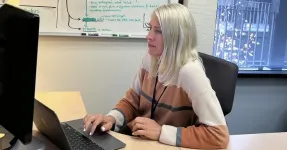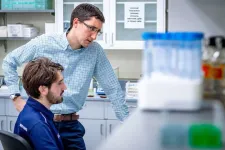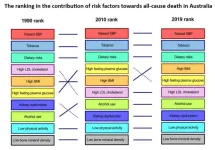(Press-News.org) “There’s a narrative out there about climate change that says there are winners and losers. Even if most of the planet might lose from the changing climate, certain industries and countries stand to benefit. And Russia is usually at the tip of people’s tongues, with Russian officials even making the claim that Russia is a potential winner.”
This portrayal, described by Debra Javeline, associate professor of political science at the University of Notre Dame and lead author on the recently published study “Russia in a changing climate,” was debated by her 16 co-authors — all Russia specialists and members of the Program on New Approaches to Research and Security in Eurasia (PONARS), a multinational cohort of academics from North America, Europe and post-soviet Eurasia.
The PONARS scholars, including Susanne Wengle, also an associate professor of political science at Notre Dame, studied the effects of climate change on Russia and Russia’s role in global efforts to combat climate change or obstruct climate action.
“We asked ourselves,” Javeline said of her research team, “does Russia stand to benefit from climate change? Are the claims made by the Russian government officials accurate in that it does benefit them?”
The PONARS network includes social scientists of different disciplinary backgrounds, allowing each co-author to contribute analysis of Russia in their respective fields, including agriculture, international affairs, the changing Arctic, public health, civil society and governance.
Drawing on their collective expertise and a comprehensive literature review, the researchers found that Russia is already suffering from a variety of climate change impacts — despite the government’s positive spin — and is ill-prepared to mitigate or adapt to those climate impacts. And, as the rest of the world transitions to renewable energy sources, Russia’s fossil-fuel-dependent government is not willing or ready to make alternative plans for the country, changes that could potentially benefit the whole of their society.
“The future of Russia is politically and economically interdependent with the future of the climate,” she said. “If we have any hope of seeing a peaceful Russia that can rejoin the international community with a more responsive government, then we can’t talk about one without the other.”
But while Russia continues to wage a carbon-intensive war in Ukraine after a full two years, it remains “increasingly isolated from the international community and its efforts to reduce greenhouse gas emissions,” the researchers wrote.
The cause for concern lies in the fact that not only is Russia considered the world’s largest country, occupying more than half the Arctic Ocean coastline, but it is also warming four times faster than Earth as a whole and is a primary emitter of greenhouse gases, according to the PONARS study.
Environmental impacts already occurring in Russia include flooding, heat waves, drought and wildfires that affect not only communities, but agriculture, forestry and water resources as well. “Russia is one of the world’s most important producers and exporters of grains,” said Wengle, an expert on Russian agriculture. “What this means is that the effects of climate change on Russian farms are a concern not only for Russians, but for everyone concerned with global markets for commodity crops and global food security.”
Global warming has had a huge influence on Russia’s permafrost, which is now thawing at alarming rates. What was once considered permanently frozen, stable ground is now defrosting, shifting and causing tremendous damage. The study pointed to increased flooding, landslides, caving or sinking of ground that supports existing infrastructures — resulting in cracked foundations and compromised shelters.
“Some Russian cities in high-latitude regions report infrastructure damage from thawing permafrost and soil instability for up to 80 percent of buildings and for pipelines,” the researchers discovered.
Russian leadership, however, interprets these climate impacts self-servingly and encourages its citizens to accept them as benefits, according to the PONARS scholars. For example, while Russian scientists warn about extreme temperatures and decreased Arctic sea ice, the Russian government touts a year-round Arctic sea route and a more livable climate overall. And although Russian climatologists study the effect of climate change, there are limited policies in place to reduce the vulnerability of some regions to climate impacts, and generally little adaptation planning and even less implementation of actual adaptations.
The researchers found that there is also a real climate leadership deficit in Russia and an absence of commitment to mitigate and adapt. “No top political leader champions a climate agenda,” they proclaimed. “Those in the highest positions of power demonstrate silence or denial.”
Furthermore, Russia’s full-scale invasion of Ukraine has exacerbated the climate emergency. “The humanitarian disaster is of the utmost importance — the number of deaths and structures that were destroyed — but the collateral damage is intense destruction to the atmosphere,” Javeline noted.
The war has brought irreparable damage to the global climate from increased military emissions, which the researchers explain as taking the form of “potentially several million extra tons of carbon dioxide equivalent.” Military operations have all had a harmful effect on the environment by adding toxic chemicals and hazardous waste into the air and water supplies.
The PONARS study serves as a framework to identify gaps in research. In particular, the scientists believe that more research is needed on the political dimensions of Russia in our changing climate — namely, taking a closer look at the country’s centralized political system and how it handles policy challenges related to climate change.
Javeline and Wengle added that the researchers hope to improve understanding of climate issues affecting Russia so that when Russian leadership does decide to acknowledge the country’s precarious position in a changing climate, there will be a reliable base of knowledge to assist them with efforts to mitigate and adapt.
Contact: Tracy DeStazio, associate director of media relations, 574-631-9958 or tdestazi@nd.edu
END
Does Russia stand to benefit from climate change?
New research examines the effect of climate change on Russia and the country’s role in addressing global environmental challenges
2024-02-21
ELSE PRESS RELEASES FROM THIS DATE:
Researchers find possible solutions to reverse Alzheimer’s Disease impact
2024-02-21
University of North Carolina at Chapel Hill researchers have developed a new drug delivery platform that harnesses helical amyloid fibers designed to untwist and release drugs in response to body temperatures.
A new research paper published on Jan. 26 in Nature Communications reveals groundbreaking structural details into how diseases form much like Alzheimer’s disease. With this knowledge, the group may have uncovered a unique mechanism to reverse both the deposits and their impact on those suffering from these conditions.
UNC-Chapel Hill researcher Ronit Freeman ...
A Mount Sinai-led study shows early success of a novel drug in treating a rare and chronic blood cancer
2024-02-21
New York, NY (February 21, 2024) – A novel treatment for polycythemia vera, a potentially fatal blood cancer, demonstrated the ability to control overproduction of red blood cells, the hallmark of this malignancy and many of its debilitating symptoms in a multi-center clinical trial led by the Icahn School of Medicine at Mount Sinai.
In the phase 2 study, the drug rusfertide limited excess production of red blood cells, the main manifestation of polycythemia vera, over the 28-week course of ...
Muscle as a heart-health predictor
2024-02-21
Body composition — often expressed as the amount of fat in relation to muscle — is one of the standard predictors of cardiac health. Now, new research from the University of California San Diego indicates more muscle doesn’t automatically mean lower risk of heart trouble.
The study, published in the Journal of the American Heart Association, found all muscle isn’t the same. Britta Larsen, PhD, says men with a higher area of abdominal muscle have a greater risk of cardiac trouble. It’s a completely different ...
Air pollution linked to more signs of Alzheimer’s in brain
2024-02-21
EMBARGOED FOR RELEASE UNTIL 4 P.M. ET, WEDNESDAY, FEBRUARY 21, 2024
MINNEAPOLIS – People with higher exposure to traffic-related air pollution were more likely to have high amounts of amyloid plaques in their brains associated with Alzheimer’s disease after death, according to a study published in the February 21, 2024, online issue of Neurology®, the medical journal of the American Academy of Neurology. Researchers looked at fine particulate matter, PM2.5, which consists of pollutant particles of less than 2.5 microns in diameter suspended in air.
The study does not prove that air pollution causes more amyloid plaques in the brain. It only ...
More than 40% of Americans know someone who died of drug overdose
2024-02-21
More than 40% of Americans know someone who has died of a drug overdose and about one-third of those individuals say their lives were disrupted by the death, according to a new RAND study.
Analyzing a national representative survey of American adults, researchers found that the lifetime exposure to an overdose death is more common among women than men, married participants than unmarried participants, U.S.-born participants than immigrants, and those who live in urban settings as compared to those in rural settings.
Rates of exposure were significantly higher in New England (Connecticut, Maine, Massachusetts, ...
Notre Dame receives Chan Zuckerberg Initiative award for neurodegenerative disease research
2024-02-21
The University of Notre Dame has received a Collaborative Pairs Pilot Project Award from the Chan Zuckerberg Initiative to study genes that affect neurodegenerative diseases, such as Alzheimer’s disease.
This is Notre Dame’s first award from the Chan Zuckerberg Initiative.
The award will fund a partnership between Cody Smith, the Elizabeth and Michael Gallagher Associate Professor of Biological Sciences at Notre Dame and a 2017 Alfred P. Sloan Fellow, and Beth Stevens, member of the Broad Institute of MIT and Harvard and a 2015 MacArthur Fellow. With their combined expertise in neurological development, they will explore how gene expression and function changes with ...
Shaping the Future of Skin Aging: 15th International Conference on Skin Challenges, November 2024
2024-02-21
Following the huge success of the previous edition, the 15th edition of the Skin Ageing & Challenges International Conference is set to take place on November 7-8, 2024, at Corinthia Palace in Malta. The conference will provide attendees with a comprehensive overview of the current landscape and future prospects in skin aging research.
Professor Jean Krutmann, conference president, is just as excited as we are: “Skin aging is complex, but by working together across different fields, we’re making incredible strides. This conference is where all that collaboration shines, helping us find new ways to keep our skin healthy and vibrant.”
Skin ...
Black hole at center of the Milky Way resembles a football
2024-02-21
BERKS, Pa. — The supermassive black hole in the center of the Milky Way is spinning so quickly it is warping the spacetime surrounding it into a shape that can look like a football, according to a new study using data from NASA’s Chandra X-ray Observatory and the U.S. National Science Foundation’s Karl G. Jansky Very Large Array (VLA). That football shape suggests the black hole is spinning at a substantial speed, which researchers estimated to be about 60% of its potential limit.
The work, led by Penn State Berks Professor of Physics Ruth Daly, was published in the Monthly Notices of the Royal Astronomical Society.
Astronomers call this giant ...
Stowers Institute Scientific Director Kausik Si receives coveted award from the Chan Zuckerberg Initiative
2024-02-21
KANSAS CITY, MO—February 21, 2024—The Chan Zuckerberg Initiative (CZI) has announced the awardees of their second cycle of Collaborative Pairs Pilot Project Awards, part of the CZI Neurodegeneration Challenge Network (NDCN).
Scientific Director Kausik Si, Ph.D., from the Stowers Institute for Medical Research will receive an award for the project titled, “Tuning memory by altering amyloids,” which will be conducted alongside Investigator Lukasz Joachimiak, Ph.D., from the University of Texas Southwestern.
The Collaborative Pairs Pilot Project Awards were launched in 2018 to investigate unsolved mysteries ...
Raised blood pressure is the leading risk factor for death in Australia
2024-02-21
Raised blood pressure has been the leading risk factor for death in Australia for the past three decades, according to a study published February 21, 2024, in the open-access journal PLOS ONE led by Alta Schutte and Xiaoyue Xu from The George Institute for Global Health and UNSW, Sydney, with colleagues across Australia. It is also the main contributor to deaths from cardiovascular disease (CVD) specifically.
Raised blood pressure has long been recognized as a contributing factor to CVD and death, but is not always prioritized in national health plans. In this study, researchers focused on Australia, which lags ...
LAST 30 PRESS RELEASES:
Public and patient involvement in research is a balancing act of power
Scientists discover “bacterial constipation,” a new disease caused by gut-drying bacteria
DGIST identifies “magic blueprint” for converting carbon dioxide into resources through atom-level catalyst design
COVID-19 vaccination during pregnancy may help prevent preeclampsia
Menopausal hormone therapy not linked to increased risk of death
Chronic shortage of family doctors in England, reveals BMJ analysis
Booster jabs reduce the risks of COVID-19 deaths, study finds
Screening increases survival rate for stage IV breast cancer by 60%
ACC announces inaugural fellow for the Thad and Gerry Waites Rural Cardiovascular Research Fellowship
University of Oklahoma researchers develop durable hybrid materials for faster radiation detection
Medicaid disenrollment spikes at age 19, study finds
Turning agricultural waste into advanced materials: Review highlights how torrefaction could power a sustainable carbon future
New study warns emerging pollutants in livestock and aquaculture waste may threaten ecosystems and public health
Integrated rice–aquatic farming systems may hold the key to smarter nitrogen use and lower agricultural emissions
Hope for global banana farming in genetic discovery
Mirror image pheromones help beetles swipe right
Prenatal lead exposure related to worse cognitive function in adults
Research alert: Understanding substance use across the full spectrum of sexual identity
Pekingese, Shih Tzu and Staffordshire Bull Terrier among twelve dog breeds at risk of serious breathing condition
Selected dog breeds with most breathing trouble identified in new study
Interplay of class and gender may influence social judgments differently between cultures
Pollen counts can be predicted by machine learning models using meteorological data with more than 80% accuracy even a week ahead, for both grass and birch tree pollen, which could be key in effective
Rewriting our understanding of early hominin dispersal to Eurasia
Rising simultaneous wildfire risk compromises international firefighting efforts
Honey bee "dance floors" can be accurately located with a new method, mapping where in the hive forager bees perform waggle dances to signal the location of pollen and nectar for their nestmates
Exercise and nutritional drinks can reduce the need for care in dementia
Michelson Medical Research Foundation awards $750,000 to rising immunology leaders
SfN announces Early Career Policy Ambassadors Class of 2026
Spiritual practices strongly associated with reduced risk for hazardous alcohol and drug use
Novel vaccine protects against C. diff disease and recurrence
[Press-News.org] Does Russia stand to benefit from climate change?New research examines the effect of climate change on Russia and the country’s role in addressing global environmental challenges







